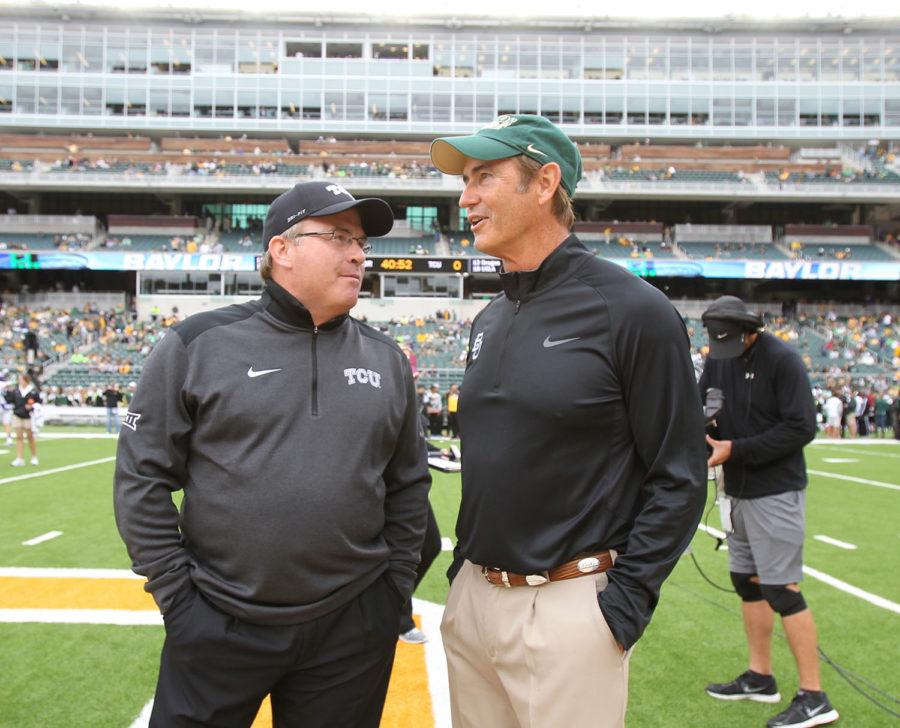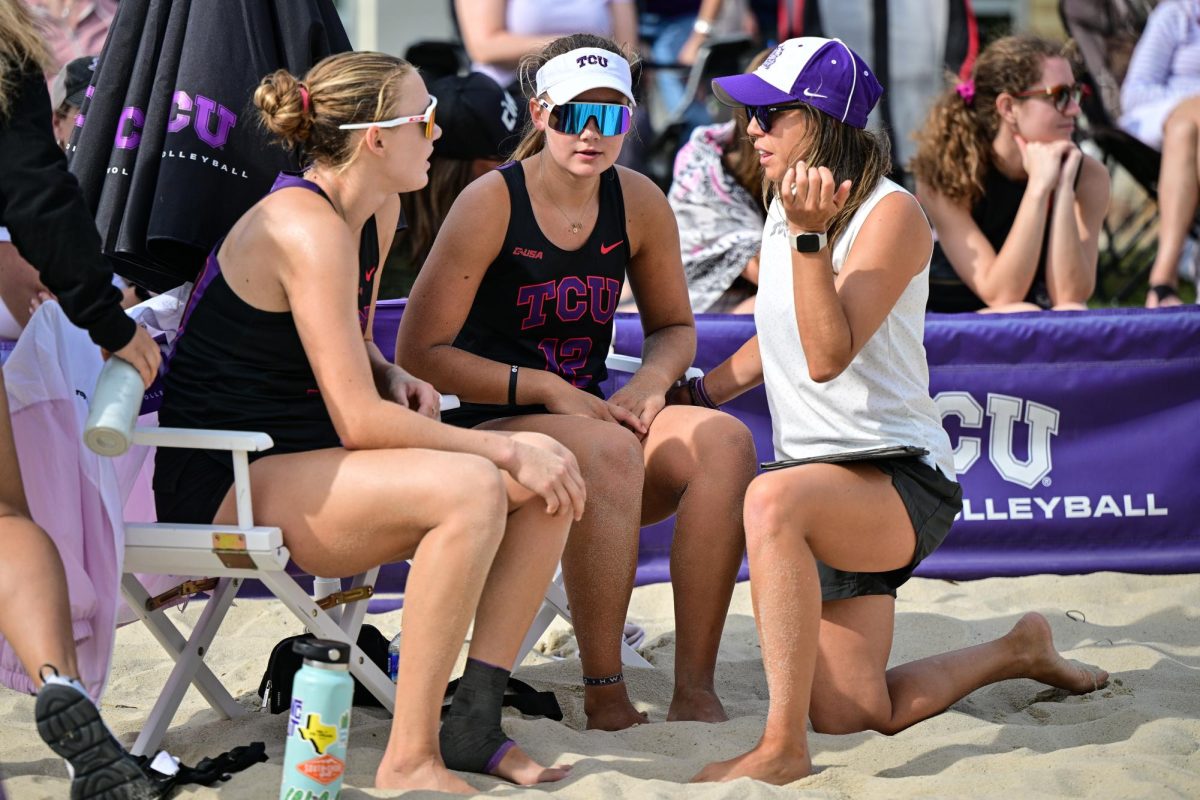When the Horned Frogs were left out of the inaugural College Football Playoffs in 2015, despite ending their season as co-Big 12 champions with an 11-1 record, head coach Gary Patterson kept his explanation simple: They had to go undefeated to control their destiny, and they didn’t.
A perfect record may once again be the requirement for the Frogs, or any Big 12 playoff hopeful, if they want a crack at the playoff this year.
The playoff committee will begin releasing their rankings in just less than two weeks, and with the committee largely composed of the same members from last season, we should have a fairly decent idea of what to expect.
And small Big 12 schools shouldn’t hold their breath waiting on some love.
Last year TCU, Baylor, Ohio State, Alabama and Oregon all finished the season with one loss, and only Florida State (FSU) ended undefeated.
At the end of the season, ESPN had the Big 12 ranked as the strongest Power-Five conference. However, that wasn’t enough to keep the playoff committee from deciding that all the other one-loss teams, which were coincidentally all big-name programs, belonged in the playoffs over TCU and Baylor.
As for FSU, the Atlantic Coast Conference (ACC) fought with the Big 10 all season for the ignominious title of the weakest P-5 conference in the power rankings. Even then, the Seminoles routinely struggled, gutting out ugly win after ugly win.
But they walked away undefeated, and fell into the No. 3 seed in the playoffs before getting embarrassed by Oregon in Pasadena.
It also didn’t help that Baylor and TCU were declared Big 12 co-champions, while the other competitors flat out won their respective conferences. Then again, the job of the committee is to choose the best four teams, not simply the teams that outright won their conference.
Speculate all you want, but the message was clear that two qualities were needed to make the playoffs. First was being a big-name program with a rich history and great marketability. Second was being undefeated.
Neither TCU nor Baylor possessed the former. That was beyond their control, and that hasn’t changed one bit this season.
The latter was feasible for one of the two to accomplish. A 21-point fourth quarter lead was not enough for the Frogs in Waco, though, and West Virginia had other plans for the Bears in Morgantown.
That brings us to 2015, where aside from the Frogs and Bears, the Big 12 comes back much weaker than it was a year ago.
Gone is the Kansas State powerhouse led by Jake Waters and Tyler Lockette. Gone is the national championship hype that surrounded Oklahoma for so many seasons. The Texas Longhorns are suffering from their worst stretch in over 50 seasons. West Virginia is slowly falling off the map after a hot start. And winless Kansas may be arguably the worst FBS team in the nation.
Oklahoma State has made some noise going 6-0, but the Cowboys still carry some of the negative stigma from a disappointing 6-6 campaign in 2014. Until they have a signature win, the odds will be against them to crack the top four.
As a whole, the strength of competition within the Big 12 has decreased from what it was a year ago, at least from the viewpoint of the few title contenders.
That’s what’s scary. If the committee wasn’t impressed with the Big 12’s superior resume from last year, no one should expect its opinion to be any higher this season. The margin for error is zero.
From what we’ve seen from the AP Poll thus far, conference opinions are playing a factor in the rankings, as subjective and inaccurate as those opinions may be.
All you have to do is look at the reigning national champion Ohio State Buckeyes and see how they compare to the Frogs. Both teams have had their slips, and they’ve objectively struggled against opponents that they were expected to dominate, but the two have found ways to win and remain undefeated.
That’s why it’s eye-opening that Ohio State has stayed put at its preseason No. 1 ranking all year long, while the Frogs have bounced like a pinball between No. 2 and No. 4 after entering the season at No. 2.
What’s also startling is that Baylor, also undefeated, has not overtaken Ohio State for the No. 1 spot despite having soundly defeated every opponent they’ve faced, unlike the Buckeyes.
Given the way the polls have treated the Frogs and the Bears even while they’re undefeated, it’s not unfathomable to vision them taking a significant drop in the rankings if they suffer one loss.
It’s not rocket science. Small Big 12 schools that lack the rich history of institutions like Ohio State, Alabama, and LSU are not easily welcomed into the top of the college football world.
People want to find a flaw, and a loss for either school is something that will be jumped on immediately. Like Florida State in the ACC last season, being undefeated is what is keeping Big 12 teams in the picture seven weeks in.
At Big 12 Media Days in Dallas in July, however, Patterson argued against the notion that a team has to avoid a loss to make the playoffs.
“Ohio State lost to Virginia Tech in their opener last season and still won a national championship,” Patterson said. “I don’t believe you have to be undefeated.”
And Patterson is right; you shouldn’t have to be. The only problem is that TCU and Baylor are not Ohio State.
It’s a battle between schools of less than 20,000 students each that just broke on to the national scene against a longtime heavyweight with a rich history and possibly the largest fan base in college football. Like it or not, the latter usually wins that political battle.
Is it fair? Not one bit. Are the Frogs, Bears, and even the Cowboys more talented than the public perceives them to be? 100 percent.
If you want, you can dismiss the AP Poll, because with the BCS system in the history books, it determines nothing in deciding the national champion.
What can’t be forgotten, however, is that the playoff committee does use the poll as a base in their rankings, which hold all the power. That can be unnerving.
With the heart of the schedule approaching for the three unscathed teams left in the Big 12, mistakes can’t be made. Maybe it will be a matter of surviving a trap game. Maybe it will be outplaying the opponent in Fort Worth on Black Friday. Anything can happen, and that’s what makes college football so beautiful.
At the end of the day, though, barring any unforeseen circumstances in another conference, the outlook appears to allow for only one Big 12 playoff representative at this rate, and only if that one squad runs the table.
If the Frogs want to be that one team, the golden ticket will be posting a zero in the right hand column. Otherwise they may be smelling peaches for the second consecutive season.












